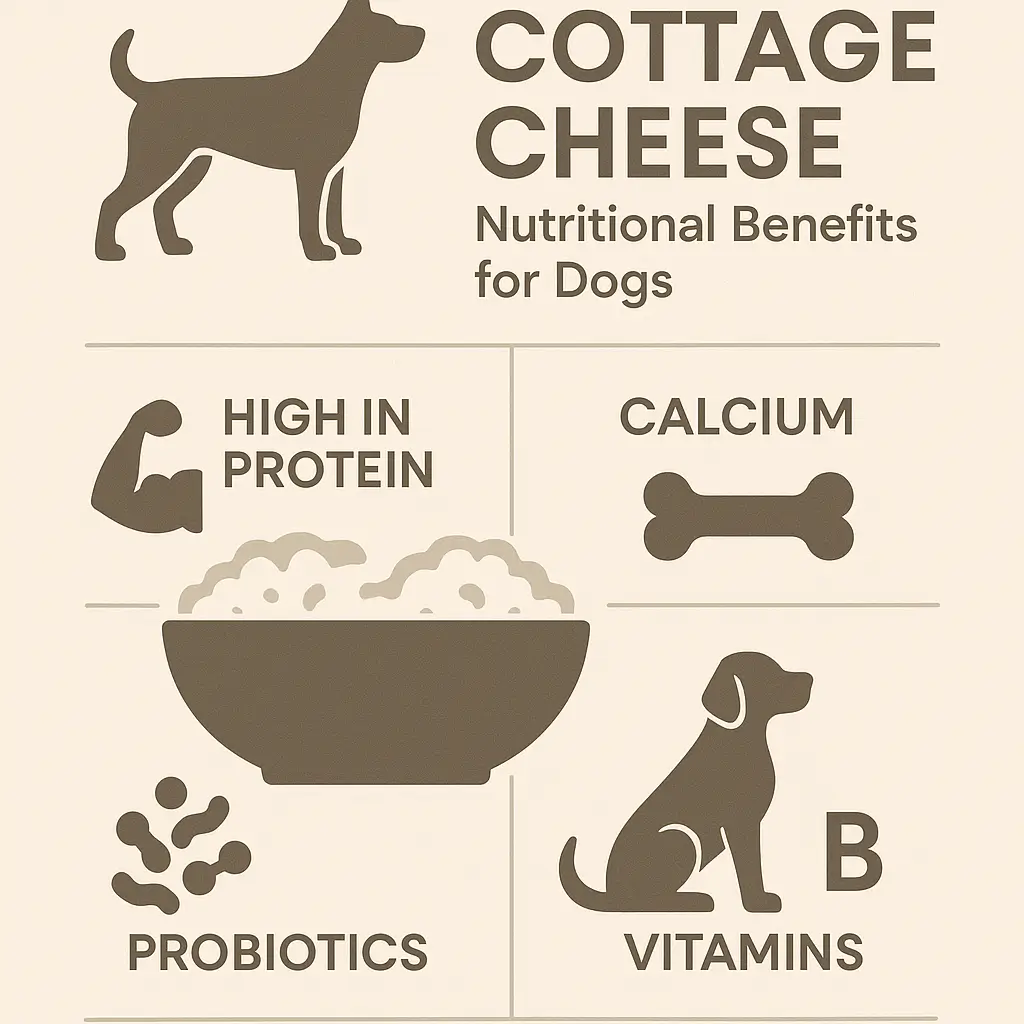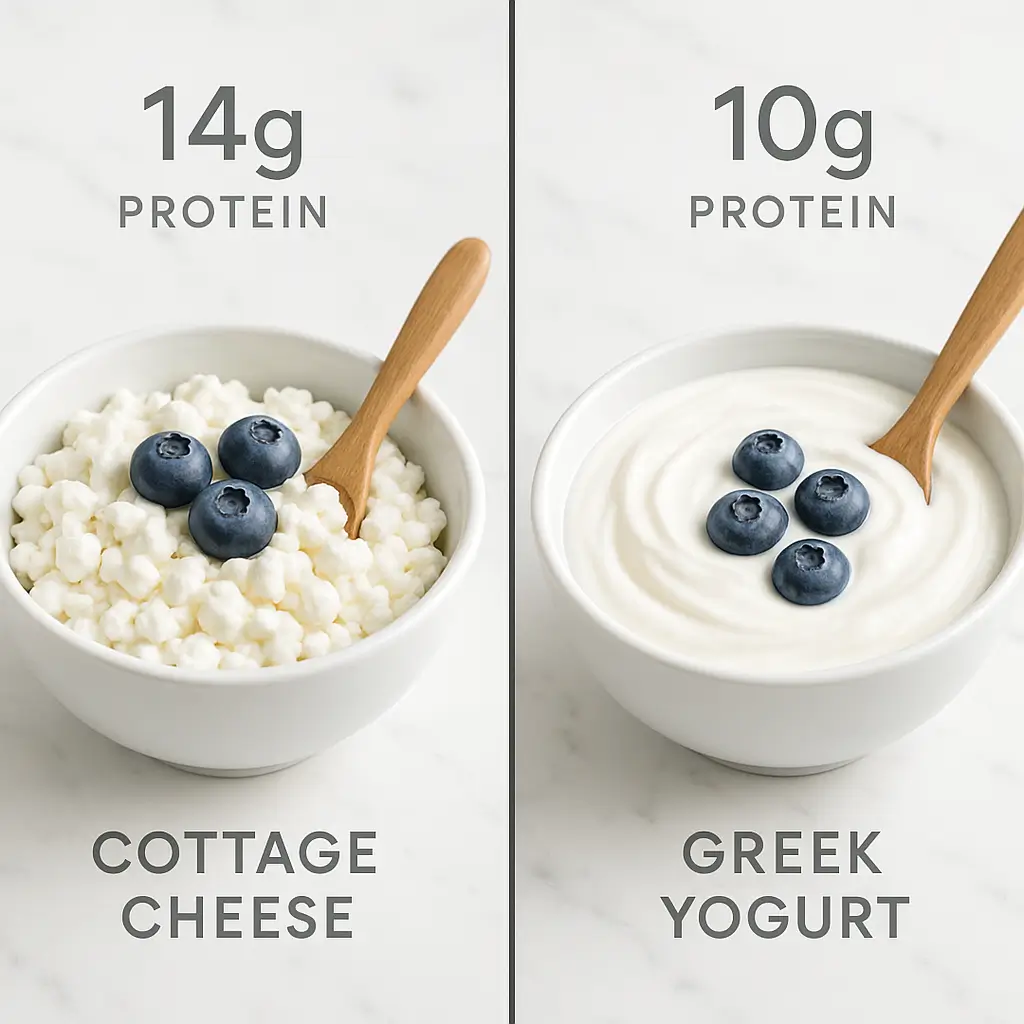
As a nutritionist who’s spent years helping families navigate healthy eating, I get asked about pet nutrition almost as often as human nutrition. One question that comes up repeatedly is whether dogs eating cottage cheese is safe and beneficial. The short answer? Yes, dogs can eat cottage cheese in moderation – and there are actually some wonderful benefits when dogs eating cottage cheese is done right.
I remember when my client Sarah first asked me about dogs eating cottage cheese, specifically for her golden retriever, Max. She’d heard it was good for dogs with upset stomachs but wasn’t sure how much was safe. After walking her through the guidelines I’m about to share with you, Max not only loved his occasional cottage cheese treats but also showed improved digestion during a particularly stressful moving period.
Table of Contents
Table of Contents
What Makes Cottage Cheese Different from Other Dairy Products
Cottage cheese stands apart from other dairy products in several important ways that make it more suitable for our canine companions. Unlike regular cheese, cottage cheese undergoes a fermentation process that significantly reduces its lactose content. This is crucial because many dogs, like humans, can be lactose intolerant.
The manufacturing process involves curdling milk with an acidic substance, then draining the whey. What remains is a protein-rich, relatively low-fat product that’s much easier for dogs to digest than milk or aged cheeses. The texture is also gentler on sensitive stomachs, making it an excellent choice for dogs recovering from digestive issues.
Why Pet Parents Are Turning to Cottage Cheese as a Dog Treat
More pet owners are discovering cottage cheese as a healthy alternative to commercial dog treats. The trend of dogs eating cottage cheese has grown significantly as owners seek natural, nutritious options. Unlike many processed treats that contain artificial preservatives, colors, and flavors, plain cottage cheese offers pure nutrition. It’s also incredibly versatile – you can serve it alone, mix it with your dog’s regular food, or use it as a base for homemade treat recipes.
The affordability factor can’t be overlooked either. A container of cottage cheese provides multiple servings for your dog at a fraction of the cost of premium dog treats, while delivering superior nutritional value. This aligns with the philosophy of budget-friendly healthy cooking that many families are embracing today.
High-Quality Protein Content and Muscle Development
Cottage cheese is a protein powerhouse, with approximately 70% of its calories coming from high-quality protein. For dogs, this means essential amino acids that support muscle development, tissue repair, and overall body maintenance. This is particularly beneficial for active dogs, growing puppies (once they’re past the initial weaning phase), and senior dogs who need help maintaining muscle mass.
The protein in cottage cheese is considered “complete,” meaning it contains all the essential amino acids dogs need. This makes it an excellent supplement to commercial dog food, especially for dogs who may need extra protein due to health conditions or increased activity levels.
Essential Vitamins and Minerals: Calcium, Phosphorus, and B Vitamins
Beyond protein, cottage cheese delivers a impressive array of nutrients that support canine health. The calcium content helps maintain strong bones and teeth – crucial for dogs of all ages. Phosphorus works alongside calcium to support bone health and plays a vital role in energy metabolism.
B vitamins, particularly B12, support nervous system function and help maintain healthy red blood cells. These nutrients are especially important for senior dogs or those recovering from illness. The combination of these nutrients makes cottage cheese a nutritionally dense treat that actually contributes to your dog’s health rather than just providing empty calories. Understanding the importance of essential vitamins and minerals can help you make better choices for both human and pet nutrition.

How Cottage Cheese Helps Dogs with Upset Stomachs and Diarrhea
One of cottage cheese’s most valuable benefits for dogs is its gentle effect on the digestive system. When mixed with white rice, it creates what veterinarians often call a “bland diet” – perfect for dogs recovering from stomach upset, diarrhea, or other digestive issues.
The mild flavor and smooth texture make cottage cheese easy to digest, while its protein content provides necessary nutrition during recovery. I’ve seen countless dogs bounce back from digestive troubles faster when their owners incorporate this simple remedy. The key is using plain, low-fat cottage cheese and introducing it gradually.
The Role of Probiotics in Canine Gut Health
Many cottage cheese varieties contain live and active cultures – beneficial bacteria that support digestive health. These probiotics help maintain a healthy balance of gut bacteria, which is essential for proper digestion, nutrient absorption, and immune function.
When choosing cottage cheese for probiotic benefits, look for labels that specifically mention “live and active cultures” or “contains probiotics.” These beneficial bacteria can be particularly helpful for dogs who’ve recently been on antibiotics or those with sensitive digestive systems.
Proper Serving Sizes Based on Dog Weight and Size
Getting the portion size right is crucial for safe dogs eating cottage cheese practices. For small dogs (under 20 pounds), start with just a teaspoon. Medium dogs (20-50 pounds) can handle about a tablespoon, while large dogs (over 50 pounds) can safely enjoy up to two tablespoons at a time.
These are starting amounts – always observe your dog’s reaction before increasing portions. Some dogs may tolerate more, while others with sensitive stomachs may need even smaller amounts. Remember, every dog is different, and what works for one may not work for another.

The 10-20% Rule for Treats and Human Food Additions
A fundamental principle in canine nutrition is that treats and additions to regular food shouldn’t exceed 10-20% of your dog’s daily caloric intake. This ensures that your dog’s primary nutrition comes from their balanced commercial food while allowing for healthy supplementation.
For perspective, if you feed your dog two cups of commercial food daily, you can safely replace up to 20% of that amount (about 0.4 cups) with healthy human foods like cottage cheese. This guideline helps prevent nutritional imbalances while allowing your dog to enjoy variety in their diet.
Low-Fat vs. Full-Fat: Which Cottage Cheese is Best for Dogs
When selecting cottage cheese for your dog, understanding the differences between varieties is essential for dogs eating cottage cheese safely. Low-fat or non-fat varieties are generally the safest choice. High-fat foods can trigger pancreatitis in susceptible dogs – a serious and potentially life-threatening condition. Low-fat cottage cheese (1% milkfat or less) provides all the nutritional benefits while minimizing this risk.
Full-fat cottage cheese isn’t necessarily dangerous for healthy dogs in small amounts, but it’s better to err on the side of caution. The lower fat content also makes it easier for dogs with sensitive digestive systems to tolerate.
Avoiding Harmful Additives and Flavored Varieties
Always choose plain cottage cheese without any additives, flavors, or mix-ins. Many flavored varieties contain ingredients that are toxic to dogs, such as garlic, onions, or chives. Even seemingly innocent additions like herbs can cause digestive upset or worse.
Read labels carefully and stick to the simplest ingredient list possible: cultured milk, cream (in small amounts), and salt. Avoid cottage cheese with high sodium content, as excessive salt can lead to health problems in dogs.
Why Cottage Cheese is Better Than Regular Cheese for Dogs
Compared to aged cheeses like cheddar or Swiss, cottage cheese offers several advantages for dogs. It contains significantly less lactose, making it more digestible for lactose-sensitive dogs. The fat content is typically lower, reducing the risk of pancreatitis and weight gain.
Regular cheeses also tend to be much higher in sodium, which can contribute to high blood pressure and other health issues in dogs. The softer texture of cottage cheese is also easier for older dogs or those with dental issues to manage.
Comparing Cottage Cheese to Yogurt for Canine Health
Both cottage cheese and plain Greek yogurt can be healthy treats for dogs, but they offer different benefits. Cottage cheese typically contains more protein per serving and less lactose, making it the better choice for dogs with dairy sensitivities.
Yogurt generally provides more probiotics, which can be beneficial for digestive health. However, cottage cheese with live cultures can offer similar probiotic benefits while being more tolerable for sensitive dogs. The choice often comes down to your individual dog’s preferences and tolerance levels.
Lactose Intolerance and Dairy Sensitivity in Dogs
Just like humans, many dogs are lactose intolerant to varying degrees, which is why dogs eating cottage cheese requires careful consideration. This means they lack sufficient amounts of lactase, the enzyme needed to properly digest lactose. While cottage cheese contains less lactose than milk or other dairy products, some dogs may still experience digestive issues.
Signs of lactose intolerance in dogs include gas, bloating, diarrhea, and stomach discomfort after consuming dairy products. If you notice these symptoms after giving your dog cottage cheese, discontinue use and consult your veterinarian.
When Cottage Cheese Might Cause Digestive Problems
Even dogs who aren’t lactose intolerant can experience digestive upset if they consume too much cottage cheese too quickly. The key to successful dogs eating cottage cheese is introducing any new food gradually, starting with tiny amounts and monitoring your dog’s response.
Dogs with a history of pancreatitis, inflammatory bowel disease, or other digestive conditions should only have cottage cheese under veterinary guidance. The rich protein and fat content, while generally beneficial, can sometimes trigger flare-ups in sensitive dogs.
Simple Cottage Cheese Recipes and Treat Ideas for Dogs
One of my favorite approaches to dogs eating cottage cheese is mixing it with a small amount of plain white rice – it’s the perfect bland meal for upset stomachs. You can also freeze small portions in ice cube trays for a refreshing summer treat.
For a protein-packed training treat, mix cottage cheese with a small amount of natural peanut butter (xylitol-free) and freeze in small molds. The combination is irresistible to most dogs and provides excellent motivation during training sessions. If you’re interested in exploring more healthy protein recipes for your family while preparing treats for your dog, you’ll find that many ingredients overlap.
Mixing Cottage Cheese with Other Dog-Safe Foods
Cottage cheese pairs beautifully with many dog-safe foods. Try mixing it with cooked sweet potato for added fiber and vitamins, or combine it with small pieces of cooked chicken for an extra protein boost. Fresh blueberries or small apple pieces (seeds removed) can add natural sweetness and antioxidants. For more inspiration on incorporating nutritious ingredients into both your and your pet’s diet, consider how many wholesome foods can benefit the whole family.
Always introduce new food combinations gradually and ensure all ingredients are safe for dogs. Avoid mixing cottage cheese with foods high in fat or sodium, as this can negate the health benefits.
Medical Conditions That May Affect Cottage Cheese Tolerance
Certain medical conditions require special consideration when it comes to dogs eating cottage cheese. Dogs with kidney disease may need to limit protein intake, making cottage cheese inappropriate without veterinary approval. Similarly, dogs with calcium-related health issues may need to avoid high-calcium foods.
Dogs taking certain medications, particularly tetracycline antibiotics, should avoid dairy products as they can interfere with medication absorption. Always inform your veterinarian about any human foods you’re giving your dog, especially if they’re on medications.
Signs Your Dog Should Stop Eating Cottage Cheese
Watch for warning signs that indicate dogs eating cottage cheese isn’t agreeing with your pet. Persistent diarrhea, vomiting, excessive gas, or signs of allergic reaction (itching, swelling, difficulty breathing) warrant immediate discontinuation and veterinary consultation.
If your dog seems uncomfortable after eating cottage cheese, develops changes in appetite, or shows any unusual behavior, it’s best to remove cottage cheese from their diet and discuss alternatives with your veterinarian.
Frequently Asked Questions
How much cottage cheese should I give my dog?
For most dogs, start with 1 teaspoon for small dogs and up to 1 tablespoon for larger dogs. As a general rule, cottage cheese should not exceed 10-20% of your dog’s daily caloric intake. For a 50-pound dog, approximately 3-6 ounces daily is considered safe, but always consult your veterinarian for personalized recommendations based on your dog’s health status.
What happens if a dog eats too much cottage cheese?
Excessive cottage cheese consumption can lead to digestive upset including diarrhea, vomiting, gas, and constipation. The high calcium content can also cause mineral imbalances, potentially leading to kidney problems or interfering with proper bone development. Additionally, too much dairy can exacerbate lactose intolerance symptoms in sensitive dogs.
Which is better for dogs, cottage cheese or yogurt?
Both cottage cheese and plain Greek yogurt offer benefits for dogs, but cottage cheese typically contains less lactose and is often easier to digest. Cottage cheese provides more protein per serving, while yogurt generally contains more probiotics. Choose plain, unsweetened varieties of either option, and cottage cheese may be the better choice for lactose-sensitive dogs.
How many times a week can I give my dog cottage cheese?
Cottage cheese can be given as an occasional treat 2-3 times per week for healthy dogs. However, it should not become a daily staple unless recommended by your veterinarian for specific health reasons. Always maintain variety in your dog’s diet and ensure treats don’t exceed 10% of their daily nutritional intake.
How does cottage cheese help a dog?
Cottage cheese provides high-quality protein for muscle maintenance, calcium and phosphorus for bone health, and beneficial probiotics for digestive wellness. It’s particularly helpful for dogs recovering from stomach upset, as it’s bland and easily digestible. The low lactose content makes it more tolerable than other dairy products for most dogs.
Conclusion
Dogs eating cottage cheese can be a wonderful addition to your pet’s diet when used appropriately. Its high protein content, digestive benefits, and versatility make it an excellent choice for health-conscious pet owners. However, like any treat or supplement, moderation is key when it comes to dogs eating cottage cheese.
Remember to start slowly, choose plain, low-fat varieties, and always monitor your dog’s response. When in doubt, consult with your veterinarian – they know your dog’s individual health needs best.
As I always tell my clients, the best nutrition plan is one that’s tailored to the individual. What works beautifully for one dog may not be suitable for another. Pay attention to your dog’s unique needs, and don’t hesitate to adjust accordingly. Your furry friend’s health and happiness are worth the extra care and attention.
For more nutrition tips, healthy recipes, and cooking advice, connect with me on Facebook where I share daily insights about making nutritious eating easier for busy families.
Print
Can Dogs Eat Cottage Cheese? A Complete Guide to Safe and Healthy Feeding
- Total Time: 5 minutes
- Yield: Varies by dog size
Description
Discover why dogs eating cottage cheese can be a healthy, protein-packed treat. Learn about benefits, safe serving sizes, and tips for digestive support.
Ingredients
- Plain low-fat or non-fat cottage cheese
- Optional mix-ins: cooked white rice, plain chicken, sweet potato, blueberries
- Ensure all ingredients are free of salt, seasoning, and harmful additives
Instructions
- Start by selecting plain, low-fat cottage cheese (1% or non-fat) with no additives or flavors.
- For small dogs (under 20 lbs), feed 1 teaspoon; medium dogs (20–50 lbs) get 1 tablespoon; large dogs (50+ lbs) can have up to 2 tablespoons.
- Introduce gradually to check for tolerance, watching for signs of lactose sensitivity (gas, bloating, diarrhea).
- Mix with plain white rice to create a bland diet for dogs with upset stomachs.
- Combine with dog-safe foods like sweet potatoes or chicken for a high-protein snack.
- Serve as a treat 2–3 times per week, not exceeding 10–20% of total daily caloric intake.
- Optional: Freeze small portions in molds with dog-safe ingredients (e.g., peanut butter, blueberries) for a cool treat.
- Discontinue use if your dog shows digestive distress or allergic reactions.
- Consult your vet if your dog has medical conditions or is on medications affected by dairy.
Notes
Always use plain, low-fat cottage cheese and introduce gradually. Consult your veterinarian before adding new foods, especially for dogs with medical conditions.
- Prep Time: 5 minutes
- Cook Time: 0 minutes
- Category: Dog Treat
- Method: No-Cook
- Cuisine: Pet Nutrition
